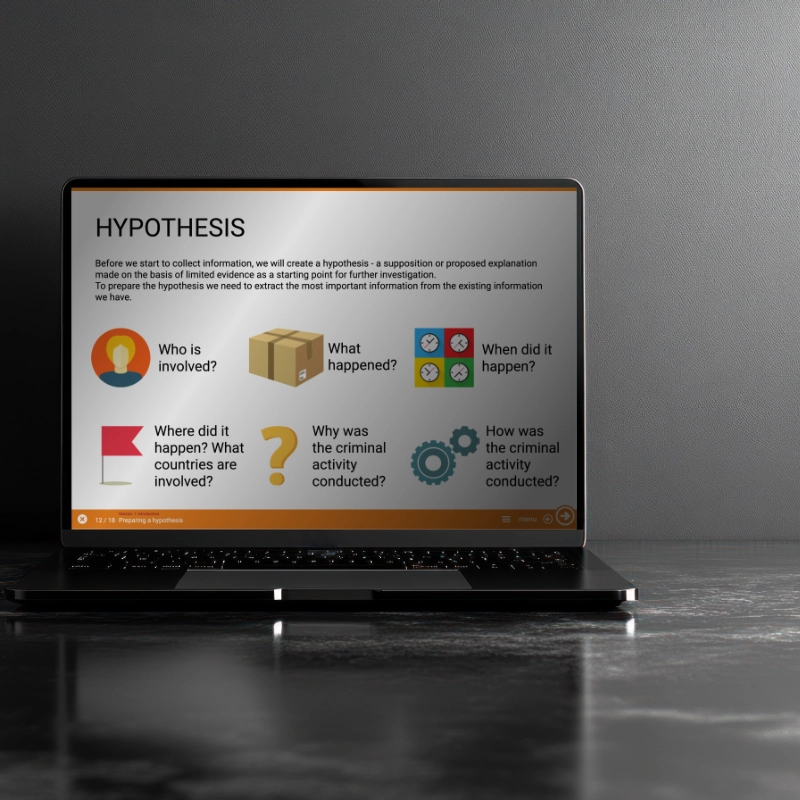Registered users
Ø Course rating
Courses & Practical resources

Basel STUDY
Looking for an advanced qualification in anti-corruption or asset recovery? Check out our postgraduate courses with the University of Basel.
Learn moreКурси
Назва курсу Data Cleaning and Harvesting
In financial investigations, disorganised data can slow you down and hide crucial insights. ...
Назва курсу Розслідування на основі відкритих даних
Розвідка з відкритих джерел (OSINT) відіграє ключову роль у сучасних розслідуваннях, дозволяючи ...
Назва курсу Міжнародне співробітництво у кримінальних справах
Розслідування випадків корупції та відмивання грошей часто ...
Назва курсу Collective Action Against Corruption
Collective Action initiatives bring together business, government, and civil society to ...
Назва курсу Oперативного аналізу
Аналіз підозрілих транзакцій, пов’язаних із відмиванням грошей або фінансуванням ...
Назва курсу Фінансовий аналіз за допомогою ExcelФінансовий аналіз за допомогою Excel
Для більшості слідчих Excel є основним інструментом для аналізу фінансової інформації...
Назва курсу Наочна демонстрація справ та грошових потоківНаочна демонстрація справ та грошових потоків
Розслідування корупції та відмивання грошей часто включають складні мережі осіб, компаній та ...
Назва курсу Аналіз джерел та використання коштів
Аналіз джерел і використання коштів – це простий, але потужний метод для доведення ...
Назва курсу Combating Terrorism Financing
As anti-money laundering (AML) and counter-financing of terrorism...
Назва курсу Introduction to blockchain: Crypto investigation and AML compliance, 5-8 May
A four-day training course on the fundamentals of crypto, financial crime and anti-money ...
Назва курсу Introduction to blockchain: Crypto investigation and AML compliance, 9-12 February
A four-day training course on the fundamentals of crypto, financial crime and anti-money ...
Назва курсу ICAR Certified Trainers Community
Welcome!
This platform is dedicated to all ICAR Certified Trainers in Financial Investigations and...
Назва курсу Illicit Enrichment Alumni
How to investigate and prosecute the offence of illicit enrichment, also known as possession of ...
Назва курсу Financial Investigation / Asset Recovery Alumni
How to use criminal investigative techniques to gather evidence in order to prove different ...
Назва курсу Introduction to blockchain: Crypto investigation and AML compliance
A four-day training course on the fundamentals of crypto, financial crime and anti-money ...
Назва курсу Survey: Continuing Education for Professionals with the Basel Institute on Governance
This survey aim to assess the needs and interests of professionals in anti-corruption, asset ...
Назва курсу Collective Action in practice: a game-changer for business integrity
At its core, Collective Action is a simple yet powerful concept: tackling corruption challenges ...
Назва курсу Illicit Enrichment: A Guide to Laws Targeting Unexplained Wealth
Illicit Enrichment by Andrew Dornbierer provides a comprehensive guide to illicit enrichment laws...
Назва курсу Guidelines for the efficient recovery of stolen assets
A set of international good practices to enhance the effectiveness and efficiency of ...
Назва курсу Guide to the role of civil society organisations in asset recovery
A practical guide to how civil society organisations can play a role in the asset recovery ...
Назва курсу Informal governance
Unwritten rules, special favours, “reaching an understanding”. Informality is what happens ...
Назва курсу Introduction to Green Corruption
This introduction to Green Corruption consists of four parts:
Part 1 of the learning series ...
Назва курсу Non-conviction based confiscation
Criminals exploit legal loopholes, borders and other avenues to conceal the proceeds of their ...
Назва курсу Managing seized and confiscated assets
News headlines often focus on the seizure or confiscation of illicit assets, such as cash, ...
Назва курсу Financial investigations in a cash economy
This Quick Guide by Emmanuel Mringo provides practical strategies for conducting financial ...
Назва курсу Business ethics and integrity
The changing landscape of anti-corruption regulation and enforcement has triggered important ...
Назва курсу Border corruption
Border corruption is a complex phenomenon with serious impacts on safety, health and security. ...
Назва курсу Strategic corruption
This Quick Guide is the second in a two-part series on the tangible yet under-addressed impacts ...
Назва курсу Corruption and security
"Corruption plays a critical role in undermining stability, global governance and international ...
Назва курсу Sexual corruption
Sexual corruption is a serious and under-recognised form of both corruption and sexual abuse. A ...
Назва курсу Public-private partnerships for financial intelligence sharing
Financial intelligence is the staple food of investigations into corruption, money laundering and...
Назва курсу Multi-agency asset recovery task forces
To effectively combat organised and financial crime, it is often necessary for countries to ...
Назва курсу Corruption and human rights
Could anti-corruption benefit from a human rights perspective? How can the two communities work ...
Назва курсу The disposal and sharing of assets
Asset recovery is a critical tool in the fight against corruption and organised crime. But what ...
Назва курсу Asset recovery legislation
Asset recovery tools are integral to combating corruption, organised crime, sanctions evasion and...
Назва курсу Informal networks and anti-corruption
Understand the role of informal social networks in enabling corruption, and why anti-corruption ...
Назва курсу Money laundering and sanctions evasion using the art market
This quick guide briefly explains the unique characteristics of the art market that make it ...
Назва курсу Money laundering through the gambling industry
This quick guide sets out how criminals abuse the gambling industry to launder illicit funds. It ...
Назва курсу Court monitoring
This quick guide explains the role of national risk assessments in addressing money laundering ...
Назва курсу National risk assessments
This quick guide explains the role of national risk assessments in addressing money laundering ...
Назва курсу Tax investigations and illegal wildlife trade
What role could tax investigations play in detecting, investigating and prosecuting cases of ...
Назва курсу Internal controls and anti-corruption
Learn what internal controls are and how they help organisations to prevent, detect and respond ...
Назва курсу Indonesia: a landmark money laundering conviction in a forestry crime case
Investigators from Indonesia’s Ministry of Environment and Forestry achieved their first-ever ...
Назва курсу International cooperation in the Migori County corruption case
Назва курсу Using full legal means to confiscate illicit assets in a time of war
In 2014, following Ukraine’s Revolution of Dignity and the deposition of President Viktor ...
Назва курсу The Kiamba case: achieving a civil asset forfeiture order and criminal prosecution
In 2014, a suspicious transaction report led Kenya’s Ethics and Anti-Corruption Commission (EACC)...
Назва курсу Windward Trading: Charging a shelf company with money laundering and returning confiscated funds to Kenyan citizens
In the Windward Trading case, Kenya and Jersey collaborated to recover and repatriate ...
Назва курсу Upholding an unexplained wealth judgement in Kenya's Anglo Leasing affair
In August 2021, Kenya’s High Court upheld a significant unexplained wealth ruling against Patrick...
Назва курсу Hout Bay and the illegal lobster trade: a case study in recovering illicit proceeds of IUU fishing and wildlife trafficking
This case study explores how South African authorities, with international collaboration, ...
Назва курсу Confiscating assets of the Shining Path terrorist organisation
This case study details the successful confiscation of nearly USD 1 million from a Swiss bank ...
Назва курсу The Russian arms dealer case
This case study explores how the Peruvian State successfully used its non-conviction based ...
Назва курсу The Kazinda case: Putting Uganda’s illicit enrichment law to good use
In a landmark case for Uganda, Geoffrey Kazinda, former Principal Accountant in the Office of the...
Назва курсу From the UK's first Deferred Prosecution Agreement to a plea bargain in Tanzania
The case of From the UK’s first Deferred Prosecution Agreement to a plea bargain in Tanzania high...
Назва курсу The Serwamba case: achieving Uganda’s first successful money laundering convictions
The Serwamba case marked Uganda’s first successful money laundering conviction under the 2013 ...
Назва курсу Sextortion: an unaddressed form of corruption and sexual abuse
Research findings from Malawi, Tanzania, Uganda and Rwanda raise concerns about the extent and ...
Назва курсу Harnessing behavioural approaches against corruption
Social norms and behaviour change (SNBC) approaches are a promising complement to conventional ...
Назва курсу Deconstructing a criminal network involved in illegal wildlife trade between East Africa and Southeast Asia
This research deconstructs a transnational criminal network involved in illegal wildlife trade ...
Назва курсу Exposing the networks behind transnational corruption and money laundering schemes
A pilot behavioural anti-corruption intervention at a public hospital in Dar es Salaam, Tanzania ...
Назва курсу Leveraging informal networks for anti-corruption in East Africa
This research explores how informal networks between citizens, businesspeople, and public ...
Назва курсу Targeting corrupt behaviours in a Tanzanian hospital: A social norms approach
A pilot behavioural anti-corruption intervention at a public hospital in Dar es Salaam, Tanzania ...
Your Benefits
Certificate of Completion
Receive a personalised certificate from the Basel Institute on Governance or its International Centre for Asset Recovery
Practical and interactive
Our courses evolve around real cases and you learn practical skills that you can use in your workplace.
Free of charge
All self-paced eLearning courses and our guides are free of charge. Just register, log in and start learning.
Always available
All self-paced eLearning courses are available 24/7. You can start any time - the only requirement is your web browser.
In your language
All of our courses are available in English and many also in other languages including Spanish, French, Portuguese and others.
Integrate Basel LEARN courses
Want to integrate Basel LEARN courses in your professional development programme or want to learn more about creating serious eLearning? Contact us.
Testimonials




